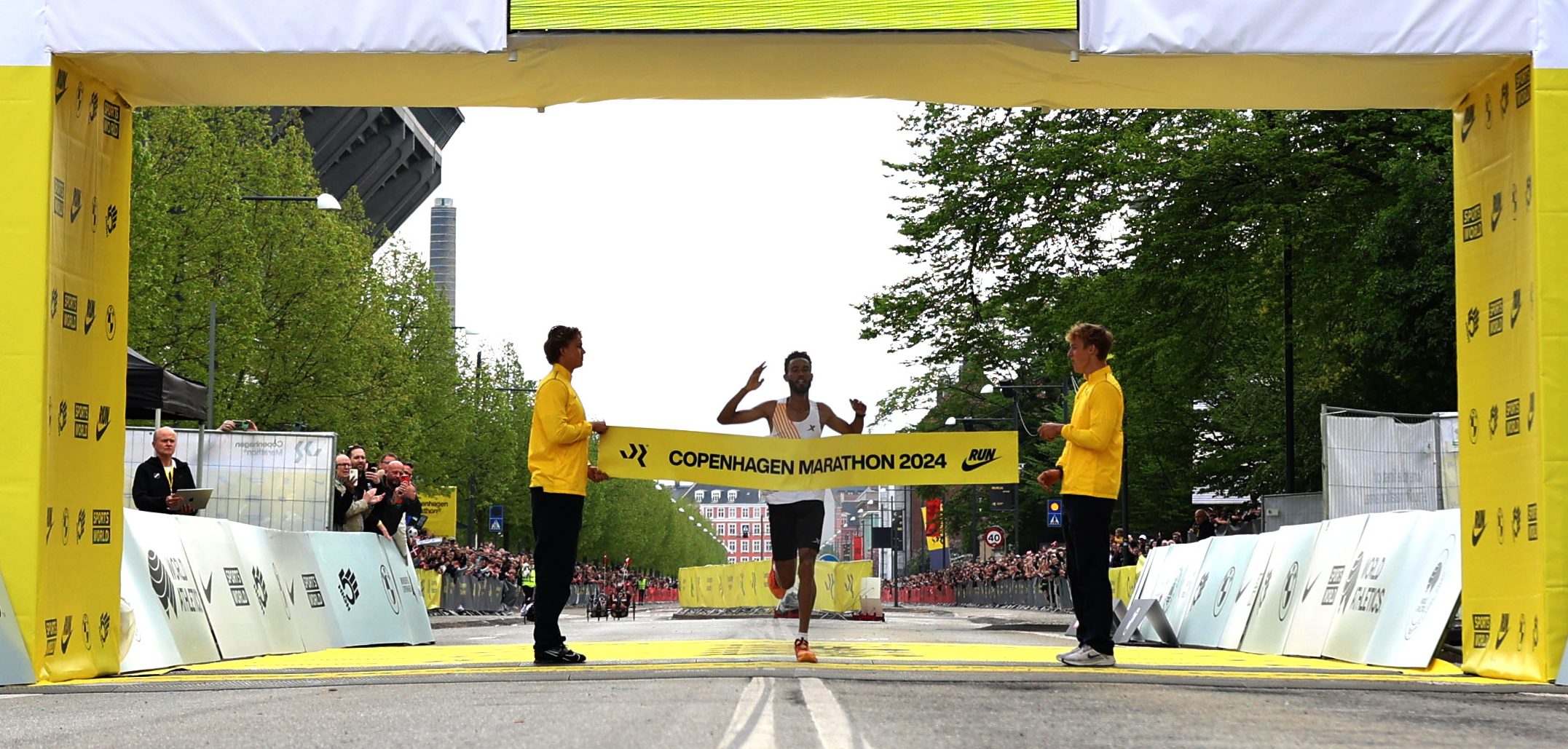
The early favourites were felled by strong challengers as Abdi Gelelchu was the fastest man at the biggest Copenhagen Marathon ever. Kenyan Margaret Agai took the honours for the women.
With all 15,000 entries sold out in January, the Copenhagen Marathon already set a historic record since the race was born in 1980. But the elite runners were aiming for more records Sunday May 5th as they took on the newly designed, fast and flat course in near perfect marathon weather.
Edition number 43 of Copenhagen Marathon was a new breakthrough for the race with the strongest starting field ever sent out into the streets of the capital of Denmark. The female winner of the day was Margaret Agai from Kenya, who surprised the favourites and finished in 2:27.31.
“I’m very, very happy. The spectators were amazing and carried us through,” Agai said shortly afterwards and found a smile when talking about meeting the Danish crowd.
In the men’s race, favourite Gadisa Birhanu was also challenged by a strong field of favourites and was ultimately beaten by Abdi Gelelchu from Bahrain, who followed up on the surprises and crossed the finish line at Øster Allé in a winning time of 2:09.11.
“I’m very happy,” were the words that came out of the mouth of a hard-pressed winner who managed to lift his thumbs in triumph.

Last year’s female winner Rodah Chepkorir came into the race as the clear favourite with her race record from 2023 of 2:23.14. However, the 33-year-old Kenyan faced very strong competition. A total of 11 women were entered with times under 2 hours and 30 minutes. Mongolia’s Khishigsaikhan Galbadrakh surprisingly broke into the top 10 at the Tokyo Marathon this year and initially conquered the pacer and opened a small gap to Chepkorir and the other favourites. After 20 kilometres, she extended her lead to over a minute and was on course for direct Olympic qualification.
But her energy ran out and instead Agai came blowing from behind in a more measured race strategy to take the win and receive the flowers and be wrapped in the Kenyan flag.
Favourite defeat in the men’s race
In the men’s race, expectations were high for Birhanu. The 31-year-old Ethiopian ran 2:04.59 when he won the Seville Marathon last year. The pacer was booked for a finishing time of just under 2:07 hours. It was a strong signal that the race record set by Eritrea’s Berhane Tsegay two years ago with 2:08.23 should be put to bed in the good conditions on an improved route. At the same time, it was well below the current time requirement for direct Olympic qualification of 2:08.10.
That goal was sought after early in the race when the favourite field of just under 10 runners completed 5 kilometres in 14.51. 25 seconds faster than the previous course record and also a pace well below the direct Olympic qualification requirements. It wasn’t enough for Gelelchu, but a lot of effort was put in to give the Danish audience a record.
After 25 kilometres, the front runners were still within reach of the race record. And after 35 km, a trio of Birhanu, Kenyan James Kiplagat and Abdi Gelelchu were decisively free and set the biodynamic GPS after breaking a yellow triumphal ribbon at the finish on Øster Allé.
Top-3 men and women
Women’s top three
1: Margaret Agai, Kenya 2:27:31
2: Mercy Kwambai, Kenya 2:28,12
3: Alisa Vainio, Finland 2:28:21
Mens top three
1: Abdi Gelelchu, Bahrain 2:09:11
2: Gadisa Birhanu, Ethiopia 2:09:55
3: Abebaw Muniye, Ethiopia 2:10:27
Facts about Copenhagen Marathon
- The Copenhagen Marathon is sold out for the first time in the race’s history, and 15,000 runners from Denmark and abroad participated.
- The organiser is Sparta Athletics & Running.
- Sparta organised the first marathon in Copenhagen in 1980 with 995 participants.
- Since 1980, Sparta has organised marathons annually (with the exception of Covid-19 lockdown in 2020 and 2021).
- The many who searched in vain for a bib number for the 2024 Copenhagen Marathon will get their chance again from June 2024, when sales for the 2025 Copenhagen Marathon open.

